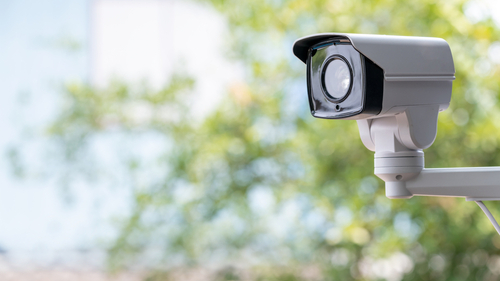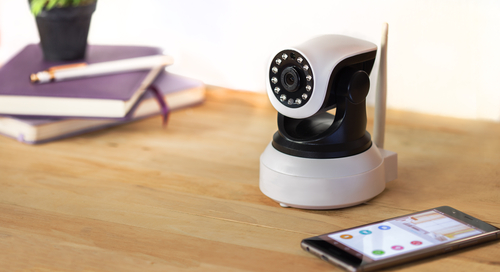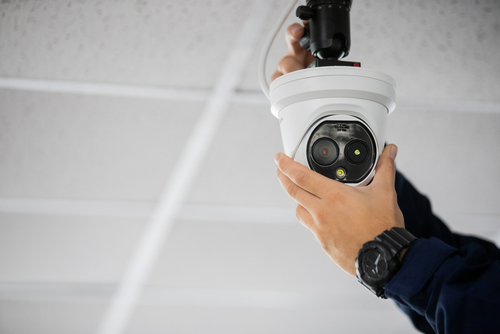
Choosing the Right Intercom System for Your Business
October 2, 2023
CCTV Cameras and Senior Care: Assisting the Elderly
November 17, 2023Choosing the Right IP Camera for Your Business

Choosing the Right IP Camera for Your Business
Choosing the Right IP Camera for Your Business. In today’s fast-paced business environment, ensuring your premises’ security is paramount.
Investing in the right surveillance equipment safeguards your business assets and personnel. IP cameras have become the go-to choice for modern businesses, offering advanced features and remote accessibility.
In this comprehensive guide, we’ll delve into the world of IP cameras, exploring the various types, key features, and considerations to help you make an informed decision.
In a world rife with security challenges, businesses must prioritize the protection of their assets, data, and employees.
The first step towards achieving this is by adopting robust security measures, and IP cameras play a pivotal role in this endeavor.
IP cameras are advanced surveillance tools that provide high-quality video footage and seamless integration with other security systems. They serve as the vigilant eyes that monitor your premises around the clock, offering peace of mind and a potent deterrent to potential threats.
This guide is designed to assist you in the selection of the ideal IP camera for your business.
Table of Contents
Types of IP Cameras
Dome Cameras
Dome cameras are known for their discreet design, making them suitable for businesses that prefer unobtrusive surveillance. They find their utility in various indoor settings, such as retail stores and offices, where aesthetics are considered.
When installing dome cameras, consider their placement and positioning for optimal coverage. These cameras are usually mounted on ceilings, providing a wide field of view.
Bullet Cameras
Bullet cameras are versatile and offer long-range visibility. They are suitable for outdoor surveillance, monitoring entrances, parking lots, and perimeter areas.
To maximize the effectiveness of bullet cameras, position them strategically to cover specific areas of interest. These cameras are generally mounted on walls or poles.
PTZ Cameras
Pan-tilt-zoom (PTZ) cameras offer the flexibility to adjust their viewing angles remotely. This feature is beneficial for businesses that require real-time monitoring of dynamic environments.
PTZ cameras are ideal for scenarios where the camera must focus on specific points of interest within a larger area, such as tracking movement in a warehouse or monitoring a large outdoor event.
Understanding Key Features

Resolution
High resolution is essential for capturing clear and detailed footage. It enables you to discern vital information, such as facial features or license plate numbers.
When choosing an IP camera, opt for the highest resolution that your budget allows. 4K cameras offer unparalleled clarity, while 1080p cameras provide a good balance between quality and affordability.
Night Vision
1. Infrared vs. Starlight Technology
Night vision is a critical feature, allowing your cameras to capture footage in low-light conditions. Infrared and starlight technologies are two popular options, each with its own advantages.
2. Low-Light Performance
Evaluate the camera’s low-light performance, as this can vary significantly among different models. A camera with excellent low-light capabilities ensures visibility even in the darkest of nights.
Field of View (FOV)
The Field of View (FOV) determines the area covered by the camera. Calculate the FOV based on your specific surveillance needs to ensure comprehensive coverage.
Some IP cameras allow for adjustments in the FOV, providing the flexibility to zoom in on particular areas or expand the view to cover a broader region.
Wired vs. Wireless IP Cameras

Wired IP Cameras
Wired IP cameras offer a stable and secure connection. They are ideal for locations where a consistent connection is crucial, such as businesses with critical security requirements.
Installing wired cameras requires careful planning, as it involves routing cables. Consider professional installation for a neat and efficient setup.
Wireless IP Cameras
Wireless IP cameras offer flexibility in installation and repositioning. They are perfect for businesses that require easy setup and mobility.
Wireless cameras may face interference from other devices or obstacles, affecting their performance. Ensure your network can handle the additional load.
Indoor vs. Outdoor Cameras
Indoor IP Cameras
1. Surveillance Inside Your Business
Indoor IP cameras are designed to monitor the interior of your business. They are discreet and often blend seamlessly with your decor.
2. Discreet Design
Indoor cameras are typically smaller and designed to be inconspicuous, ensuring they don’t disrupt the ambiance of your business premises.
Outdoor IP Cameras
1. Weatherproofing and Durability
Outdoor IP cameras are built to withstand the elements. They are weatherproof, ensuring they function effectively in rain, snow, or extreme temperatures.
2. Enhanced Security Outdoors
Outdoor cameras are essential for securing the perimeter of your business. Their presence alone can deter potential intruders.
Audio and Two-Way Communication

Audio Surveillance
Audio surveillance allows you to capture sound alongside video. However, be mindful of privacy laws when implementing audio recording.
Two-Way Communication
Two-way communication enables you to interact with individuals on your premises. This feature can be valuable for security personnel.
Besides security, two-way communication can enhance customer service by allowing interactions with visitors or customers.
Mobile Viewing and Remote Access
Importance of Remote Access
Remote access to your IP camera feeds is invaluable, allowing you to monitor your business from anywhere, at any time.
Mobile Apps and Compatibility
Choose IP cameras that offer mobile apps for seamless access on your smartphone or tablet. Ensure the apps are compatible with your devices.
Cloud Storage and Backup
Consider cameras that offer cloud storage for video footage. This provides a secure backup of critical data, safeguarding it from potential theft or damage.
Integration with Other Systems
Compatibility with Existing Security Systems
Your IP cameras should seamlessly integrate with your existing security systems, such as alarms and access control.
Integration with Smart Home and Office Systems
Explore cameras that can be integrated with your smart home or office systems for enhanced convenience, allowing centralized control.
Alarm and Notification Integration
IP cameras with alarm and notification features can alert you to unusual activities or breaches, ensuring a rapid response to security incidents.
Cost Considerations

Upfront Costs
Invest in high-quality cameras that align with your business’s specific needs. Remember that cutting costs on surveillance can lead to vulnerabilities.
Professional installation may incur additional costs but ensures a proper setup, optimizing camera performance.
Ongoing Costs
Regular maintenance is crucial to ensure your camera functions flawlessly over time—budget for periodic servicing.
If you opt for cloud storage, be prepared for subscription fees, which vary depending on the amount of data and duration of storage.
Choosing the Right IP Camera for Your Business
To select the right IP camera, assess your business’s security requirements, considering factors like location, size, and potential risks.
Choose cameras that offer customization options and scalability to adapt to your evolving security needs.
When in doubt, seek advice from security experts who can provide tailored recommendations based on your unique business context.
Frequently Asked Questions (FAQs)
What is the difference between IP cameras and analog cameras?
IP cameras transmit data over the internet, offering higher image quality, remote accessibility, and easy integration with other systems. Analog cameras use traditional cables and are generally limited in features and functionality.
Can I install IP cameras myself, or should I hire professionals?
While some IP cameras are designed for DIY installation, professional installation is recommended for complex setups, ensuring optimal performance and security.
How much storage space do I need for video footage?
The storage space required depends on factors like camera resolution, the number of cameras, and retention periods. Consult with your camera provider to estimate your storage needs accurately.
What security features should I look for in an IP camera?
Look for features like motion detection, encryption, two-way audio, and compatibility with security systems. These features enhance the overall security of your surveillance setup.
How often should I perform maintenance on IP cameras?
Regular maintenance, including cleaning lenses, checking connections, and updating firmware, should be performed annually to ensure optimal camera performance.
Choosing the Right IP Camera for Your Business – Conclusion

Selecting the right IP camera for your business is a crucial decision directly impacting your security measures. Making an informed choice enhances the safety and protection of your assets, employees, and operations.
In the era of evolving security threats, smart surveillance with IP cameras is a proactive measure that ensures your business is well-prepared to face any challenges that may arise.
In conclusion, choosing the right IP camera is a significant step toward safeguarding your business.
We trust that this guide has equipped you with the knowledge to make a well-informed decision.
Should you have any further questions or require assistance, don’t hesitate to contact our team of experts. Your business’s security is our priority, and we’re here to help you every step of the way.
Are you seeking professional and reliable CCTV camera installation services in Singapore? Contact us today!



